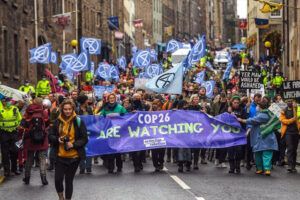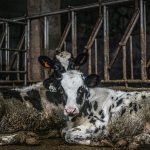The 26th United Nations Climate Change Conference, known as COP26, was happening in Glasgow, Scotland, 31. Oct – 12. Nov 2021. The purpose of COP26 was to discuss global warming, define the main contributors, and find a solution to end it as quickly as possible.
What are the goals of COP26?
Countries were asked to come up with ideas on how to reduce greenhouse emissions by 2030, reaching net-zero by 2050 and trying to keep 1.5 degrees celsius within reach.
You cannot get through a single day without having an impact on the world around you. What you do makes a difference, and you have to decide what kind of difference you want to make.
Jane Goodall
Topics and goals discussed were quite encouraging, but many say – incomplete. Let us dive into the COP26 goals:
- Speed up the end of coal usage
- Minimize deforestation
- Speed up switching to electric cars
- Give subventions for investments in switching to renewable energy
- Protect communities, natural habitats, and ecosystems
- Build protection systems, alarms and improve infrastructures to save agriculture, homes and save lives.
Also Read: Is It Even Possible To Restore Our Planet?

To achieve these goals developed countries were asked to provide at least $100 billion in climate finance per year. All international financial institutions must work together, to provide trillions in the private and public sector to secure global net zero.
It is a good step forward, and it is encouraging that somebody finally understood the importance of saving the planet. By achieving that, it has to be on a global plan. Big players must work together for making faster changes than individuals.
What was missing at COP26?
What was discouraging was that food production and making a global sustainable food system was not on the list. Why does nobody mention meat production, which takes one-fourth of the global pollution? And is the second-largest emitter of CO2 and methane?
With 88 billion animals raised for food yearly, intensive farming is responsible for up to 16.5% of the human-made greenhouse emissions. That is more than global transport. Why switching to electric cars was the topic, but livestock was not?
Why switching to a plant-based diet was not the question, since it is responsible for global warming?
Farms were mentioned but in the context of some sustainable approaches, which are not logical and feasible in reality.

Besides pollution and deforestation, the meat industry also contributes to land degradation, species extinction, pollution of air and water, destroying habitats, ecosystems, and using abnormal amounts of water.
What about methane?
Methane was also underestimated at the COP26. The main focus was on other greenhouse gases. There was a word that methane should be reduced by 30%, which isn’t enough. Methane is a toxic gas, that holds temperatures more than any other greenhouse gas. Also, it’s responsible for raising the annual temperature.
40% of methane emissions come directly from agriculture. So that might be the reason for not mentioning that topic. There was a small talk about methane, how they can use new technologies for storing methane and using it for other purposes, but nobody spoke about actually cutting it off in the future.
The facts and the researches are clear. Adopting a more plant-based diet is the most important thing in reducing global warming.
COP26 was a perfect place and a moment to do this, but somehow it just went without even mentioning the importance of ending massive meat production. Maybe the economy is more important here than actually saving the planet. Because switching to electric cars and renewable sources of energy are good, but also brings profit to businesses. Ending massive food industry would result in some economic losses for sure. And global leaders are still not prepared for that.
We can be pretty sure that meat farms were in the air at the conference, as global leaders are for sure aware of the facts, just the final act is missing.
Why The Vegan Society isn’t satisfied with COP26?
The Vegan Society was trying hard to get food farming on the agenda, by preparing facts why a plant-based diet is a must to discuss. They have been making supporting campaigns, petitions, and calling out world leaders who will be present at the COP26, but still, the topic remained untouched.
They believe that the planet and future generations will pay a high price if we fail to engage the public on sustainable food and set radical targets for the future.
But the conference was a failure for itself, too. They have been making last-minute changes to the goals they first adopted. And it was the goal set in the first place – the end of coal usage in the future. But, in the end, instead of agreeing on slowly cutting the coal off, they decided it is better to reduce it step by step, which makes a big difference. Meaning, the end of coal consumption will not happen over time, just the reduction.
Love for the planet or love for the economics?
All this talk about switching to clean energy, and avoiding important topics, seems like a secretly premeditated economic plan.
Such a big issue as the meat industry, which directly affects the goals on the COP26 list, was hidden during the conference. Participants at the event are world leaders who are certainly aware of the truth.
 There have been climate marches in Glasgow that demanded undertaking actions for a new sustainable food system. Protestants were holding various signs to prove the point and draw attention to the world leaders who participated in the summit.
There have been climate marches in Glasgow that demanded undertaking actions for a new sustainable food system. Protestants were holding various signs to prove the point and draw attention to the world leaders who participated in the summit.
The fun fact is that food served in canteens during the conference had more than 60% of dishes with meat, dairy, or eggs, which production destroys the planet. Some protestors indicated that it is equivalent to serving cigarettes at a lung cancer conference.
Many argue that the targets set at the COP26 are not achievable without reductions in meat production, so what is the hidden point of the whole event?
Conclusion
COP26 was an opportunity to make changes. Maybe it is a missed chance, maybe they will be more aware on the next occasion, as nobody is happy with the outcome.
If you are really about going green, and changing the world’s habits, you need to be radical and have a full approach to the problem from beginning to the end, and strike with all forces, rather than doing it partially as it suits you.
So it seems everything is again left to individuals, so spread awareness and hope for the best in the future! Go vegan!


